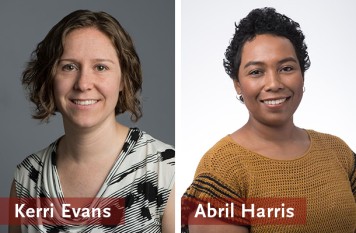
Each spring, two doctoral students at the Boston College School of Social Work are awarded fellowships to further their research and their work in the field. The Carolyn B. Thomas Fellowship, established in 1989 by a longtime BCSSW professor, recognizes the accomplishments and supports the future endeavors of a doctoral student who works with families and children, while the Elaine Pinderhughes Fellowship is given each year to an outstanding African-American PhD student.
This year’s recipient of the Pinderhughes Fellowship is Abril Harris, who is finishing the first year of her doctoral studies. Harris’s current research focuses on the experiences of African-American mothers as they prepare their sons for potential interactions with the police.
“I believe that this particular experience has not been thoroughly examined or understood,” Harris says. She plans to use the Pinderhughes funding to organize focus groups with mothers in communities in and around Boston and provide meals to the mothers who come to share their experiences with her.
Harris, who is also an active member of the Graduate Students of Color association and participated in the inaugural Racial Justice Symposium at Boston College in March, hopes that her findings will be of use both to social workers who work with African-American mothers, and to police officers themselves.
“I think this will also be helpful for the police, as it can help inform their work and the impact they make on communities,” she says.
Kerri Evans, the recipient of the 2018 Thomas Fellowship, also plans to use her fellowship funding to further her work with communities in the Boston area. Under the guidance of Thomas Crea, an associate professor at BCSSW and chair of the Global Practice Program, Evans is conducting research on the experiences and needs of immigrant children who have migrated to the U.S. without their biological parents. Primarily, their project is designed to study how these children are adjusting to their new school systems and assess their mental health needs—to help them integrate into their new schools and communities in the U.S.
“I’m interested in welcoming communities and welcoming schools,” Evans says. “What gives kids a sense of belonging and being accepted by others? What are the programs and policies that aid them, and what’s not working?”
With the financial support from the fellowship, Crea, Evans, and her fellow PhD student Robert Hasson plan to broaden the scope of their project by traveling to several towns in Massachusetts to interview unaccompanied, high school-age immigrants and refugees about their experiences at school. During this initial research phase, they are gathering data on which kinds of activities and support systems—mentoring programs, sports, religious communities, and bullying prevention programs, among others—the students are finding most helpful.
“We want to get a sense of what’s working for the kids, and then advocate for more of those programs,” Evans says.
Evans’s research has roots in her practice. Her interest in the school lives of immigrant and refugee children began in Baltimore, where she worked for nearly eight years as a social worker in the foster care system. Many of the unaccompanied children she worked with felt relatively secure in their foster homes, she says, but they struggled at school, where language, cultural differences, and bullying all presented potential barriers to integration and comfort. She came to the School of Social Work, she says, to gain the research skills and specific expertise she will need to continue advocating for the needs of these children for the rest of her career.
Harris’s work with African-American mothers also stems from her personal experience. “This project is based on a personal longing to understand the parenting experience that occurs when preparing for police interactions,” she says. “I think about social work research as a scientific method to take the stories that are shared with me and amplify them in any way possible in hopes of inciting change that leads to transformation and liberation.”

